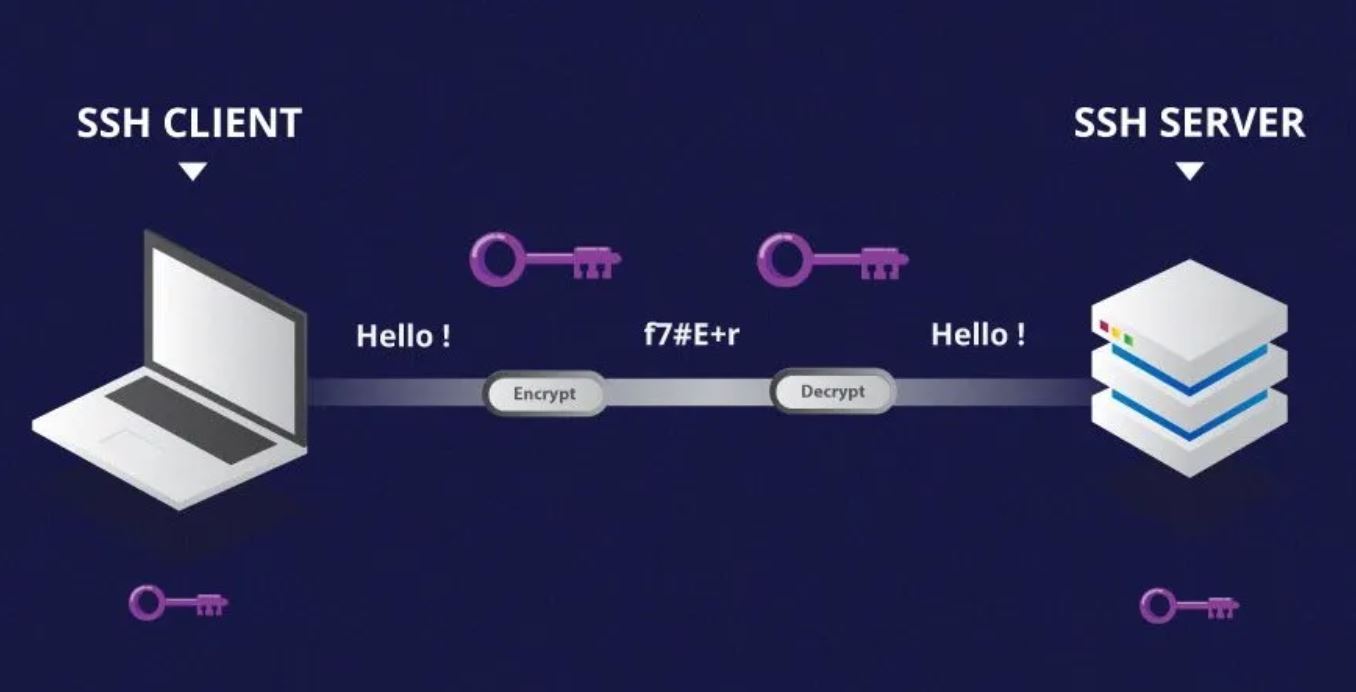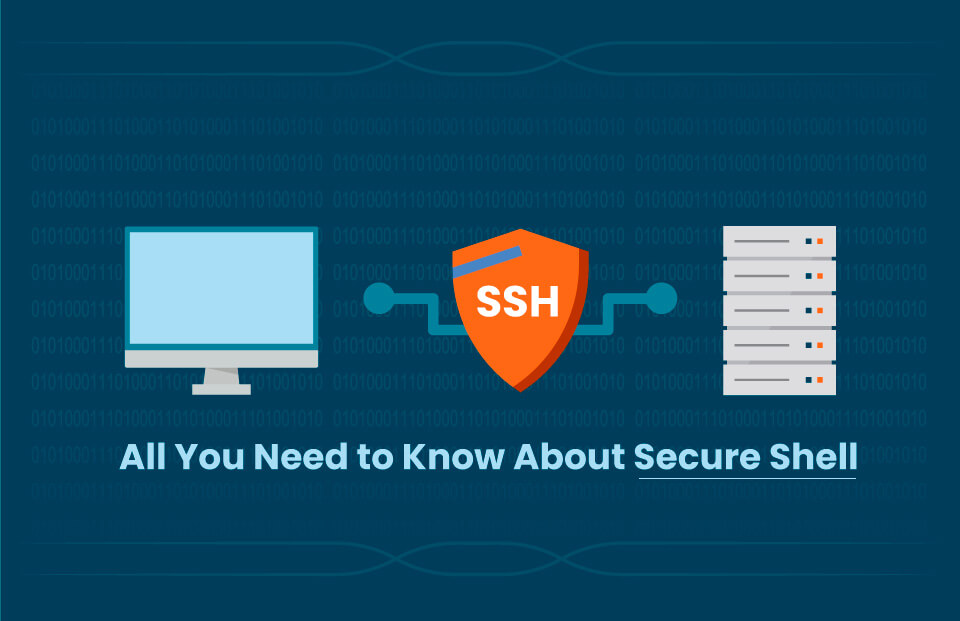In a world increasingly reliant on interconnected devices, is your data truly safe? The answer might surprise you: it hinges on the robustness of protocols like Secure Shell (SSH), a cornerstone of secure communication in our hyper-connected age.
Secure Shell (SSH) stands as a cryptographic network protocol meticulously engineered for secure communication across unsecured networks. In essence, it's your digital bodyguard, ensuring confidentiality, integrity, and authentication as data traverses the often-treacherous landscape of the internet. Its primary function is to provide a secure channel over an unsecured network by encrypting the data exchanged between the client and the server, a function that is particularly critical within the burgeoning Internet of Things (IoT). The rise of IoT devices, from smart thermostats to industrial sensors, has amplified the need for robust security measures, placing SSH squarely in the spotlight.
| Category | Information |
|---|---|
| Name | Secure Shell (SSH) |
| Type | Cryptographic Network Protocol |
| Function | Secure communication over unsecured networks |
| Key Features | Encryption, Authentication, Data Integrity |
| Common Uses | Remote Login, Command Execution, Data Transfer |
| Relevance to IoT | Securing communication between IoT devices |
| Related Technologies | Virtual Network Connection (VNC), Remote Desktop Protocol (RDP) |
| Further Reading | SSH.com - SSH Protocol |
The applications of SSH are broad and impactful. It is widely used for remote login, allowing administrators and users to securely access and manage computer systems from anywhere in the world. Beyond simple access, SSH facilitates command execution, enabling the remote control of systems and the automation of tasks. Furthermore, it plays a pivotal role in data transfer, ensuring that sensitive information remains protected during transit between computers. Consider, for example, remotely accessing an IoT device through a secure SSL/TLS tunnel via a cloud gateways web portal page.
- Meredith Bagans Zak Bagans Sister Family Life Facts
- Johan Riley Fyodor Taiwo Samuel Facts About Heidi Klums Son
In the realm of IoT, the importance of SSH is particularly acute. IoT devices, often deployed in vulnerable environments, are prime targets for cyberattacks. SSH provides a crucial layer of defense, safeguarding these devices from unauthorized access and data breaches. Given the exponential growth of connected devices, the security challenges are only intensifying. Ensuring data security and integrity has become paramount, making SSH an indispensable tool for developers, system administrators, and security professionals alike.
Consider the scenario of setting up a SocketXP IoT agent for remote access. By following a series of carefully designed steps, one can leverage SSH to securely manage and control IoT devices. This level of secure remote access is critical for a wide range of applications, from monitoring industrial equipment to managing smart home devices.
To fully appreciate the significance of SSH, it's important to understand its core functionality. At its heart, SSH is a protocol used to provide secure, encrypted communication between devices over an insecure network. This encryption ensures that even if an attacker intercepts the data, they will be unable to decipher its contents. SSH also incorporates robust authentication mechanisms, verifying the identity of both the client and the server, further bolstering security.
When evaluating security solutions, it's essential to distinguish between different types of protocols. For instance, it's crucial to recognize that not all components of a communication system are inherently secure. While SSH provides a secure channel, underlying layers, such as transport layers, may not offer the same level of protection without additional safeguards. Secure Shell Protocol facilitates secure remote login over an insecure network and is one of the most trustworthy and secure methods for accessing SSH IoT devices behind firewalls.
Several techniques can be employed to enhance remote access capabilities, including SSH, Virtual Network Connection (VNC), and Remote Desktop Protocol (RDP). Each of these protocols offers unique advantages and disadvantages, depending on the specific requirements of the application. SSH, however, stands out for its strong security features and widespread adoption.
End users increasingly demand seamless access to their devices and equipment through web or mobile apps. SSH plays a critical role in enabling this access, providing a secure foundation for remote management and control. This is particularly important in industries such as manufacturing, healthcare, and transportation, where real-time monitoring and control of remote assets are essential.
The rapidly evolving landscape of IoT presents both opportunities and challenges. As more devices connect to the internet, the attack surface expands, creating new vulnerabilities that must be addressed. SSH provides a proactive approach to security, mitigating these risks and ensuring the confidentiality, integrity, and availability of data.
While searching for reliable solutions, it's essential to ensure that the information you're relying on is accurate and up-to-date. Inaccurate or outdated information can lead to flawed security practices and potentially disastrous consequences. Always verify the source of your information and consult with security experts when necessary.
In the IoT network, SSH serves as a critical component, acting as both a gateway and a secure network protocol. It enables devices to communicate securely with each other and with central servers, regardless of their location or the underlying network infrastructure. This is particularly important in environments where devices are distributed across multiple locations and connected via untrusted networks.
Consider the challenges that arise when deploying IoT devices in a government network. The potential risks are significant, ranging from data breaches to system compromise. SSH provides a crucial layer of defense, preventing unauthorized access and ensuring that sensitive information remains protected. However, it's important to recognize that SSH is not a silver bullet. It must be implemented as part of a comprehensive security strategy that includes firewalls, intrusion detection systems, and other security measures.
The issue of fragmentation poses another significant challenge in the IoT landscape. With a diverse range of devices and protocols, ensuring interoperability and security can be complex. SSH provides a common foundation for secure communication, simplifying the integration of disparate devices and reducing the risk of vulnerabilities.
Cloud platforms like AWS have further simplified the process of connecting to remote devices using SSH, VNC, or RDP. By providing support for multiple simultaneous TCP connections, these platforms enable the establishment of secure tunnels for remote access. This allows administrators to manage and control devices from anywhere in the world, without compromising security.
The use of multiple simultaneous Transmission Control Protocol (TCP) connections allows for the creation of secure tunnels, facilitating access to remote devices. This capability is particularly valuable in scenarios where devices are located behind firewalls or other network barriers. By establishing a secure tunnel, administrators can bypass these restrictions and gain access to the devices without compromising security.
Overall, SSH is a crucial component of a secure network infrastructure, providing a robust and reliable method for remote access and secure communication. Its strong encryption and authentication mechanisms make it an essential tool in the realm of IoT networks, where data security and privacy are of paramount importance. Without SSH, the risk of data breaches and system compromise would be significantly higher, potentially undermining the entire IoT ecosystem.
The benefits of using SSH in IoT are numerous. It offers a comprehensive set of security features that protect data from unauthorized access, ensuring confidentiality and integrity. It simplifies remote management and control, allowing administrators to monitor and maintain devices from anywhere in the world. And it provides a foundation for secure communication, enabling devices to interact with each other without compromising security.
Secure Shell (SSH) offers a range of benefits when it comes to implementing secure communication in IoT deployments. Let's explore some of the key advantages of using SSH in IoT. These advantages underscore the value of SSH as a fundamental security tool in the IoT ecosystem.
One of the primary benefits of SSH is its ability to encrypt data exchanged between devices. This encryption ensures that even if an attacker intercepts the data, they will be unable to decipher its contents. This is particularly important in environments where data is transmitted across public networks or untrusted channels.
The role of SSH in the IoT network is multifaceted. It serves as a secure gateway, protecting devices from unauthorized access. It provides a secure channel for data transmission, ensuring confidentiality and integrity. And it enables remote management and control, allowing administrators to monitor and maintain devices from anywhere in the world.
IoT devices often operate in environments where data is transmitted across multiple, sometimes insecure, networks. This creates a significant security challenge, as data can be vulnerable to interception and tampering at various points along the transmission path. SSH provides an essential layer of protection, mitigating these risks and ensuring that data remains secure throughout its journey.
Security is paramount, as the proliferation of IoT devices creates new vulnerabilities. Each new device represents a potential entry point for attackers, increasing the risk of data breaches and system compromise. SSH helps to mitigate these risks by providing a secure foundation for communication and management.
SSH provides an essential layer of protection in IoT networks for several reasons. First, it encrypts data, preventing unauthorized access. Second, it authenticates users, ensuring that only authorized individuals can access devices and data. And third, it provides a secure channel for communication, preventing tampering and interception.
SSH, short for Secure Shell, is a cryptographic network protocol that provides a secure way to access remote systems over an unsecured network. It's like having a secure tunnel through the internet, allowing you to connect to your devices and data without fear of eavesdropping or tampering.
It is widely used in various domains, including IoT, to establish secure communication and manage devices remotely. From industrial control systems to smart home devices, SSH provides a critical layer of security, protecting sensitive data and preventing unauthorized access.
SSH, or Secure Shell, is a cryptographic network protocol designed to secure communication between devices over an unsecured network. It's the digital equivalent of a locked door, ensuring that only authorized individuals can access your data and systems.
Its significance grows exponentially in the realm of IoT, where countless interconnected devices require secure management and data transfer. As the number of connected devices continues to increase, the need for robust security measures like SSH becomes even more critical.
Secure Shell (SSH) has become an indispensable tool in the modern era of interconnected devices, especially within IoT networks. It's the backbone of secure remote access, providing a safe and reliable way to manage and control devices from anywhere in the world.
As more devices connect to the internet and communicate with each other, ensuring secure communication is paramount. Without SSH, the risk of data breaches and system compromise would be significantly higher, potentially undermining the entire IoT ecosystem. Therefore, understanding and implementing SSH is not just a best practice, it's a necessity in today's interconnected world.



Detail Author:
- Name : Murl Bins
- Username : rbartell
- Email : wbechtelar@gusikowski.com
- Birthdate : 1986-11-17
- Address : 14911 Lesch Vista East Jonasstad, WY 95543-3629
- Phone : +1 (747) 809-6069
- Company : Thiel-Spencer
- Job : Host and Hostess
- Bio : Ab voluptas quasi maxime dolorem. Eius unde asperiores beatae et expedita. Voluptas voluptatem voluptatem earum officiis.
Socials
tiktok:
- url : https://tiktok.com/@oswald4445
- username : oswald4445
- bio : Odio et et molestiae velit est voluptas. Aliquam hic aut iusto officia quo ut.
- followers : 4722
- following : 2681
linkedin:
- url : https://linkedin.com/in/hermano
- username : hermano
- bio : Nisi et nesciunt totam.
- followers : 2943
- following : 1037
facebook:
- url : https://facebook.com/oherman
- username : oherman
- bio : Magni enim aperiam et. Eos id sed atque et maxime.
- followers : 1415
- following : 2061
twitter:
- url : https://twitter.com/oswaldherman
- username : oswaldherman
- bio : Eius eligendi reprehenderit et debitis. Reiciendis perspiciatis vel et voluptates est tempora.
- followers : 697
- following : 1643
instagram:
- url : https://instagram.com/oswald_herman
- username : oswald_herman
- bio : Accusamus provident quaerat quia laborum eos qui omnis. Dolores et ipsam aut harum non incidunt.
- followers : 6184
- following : 1707